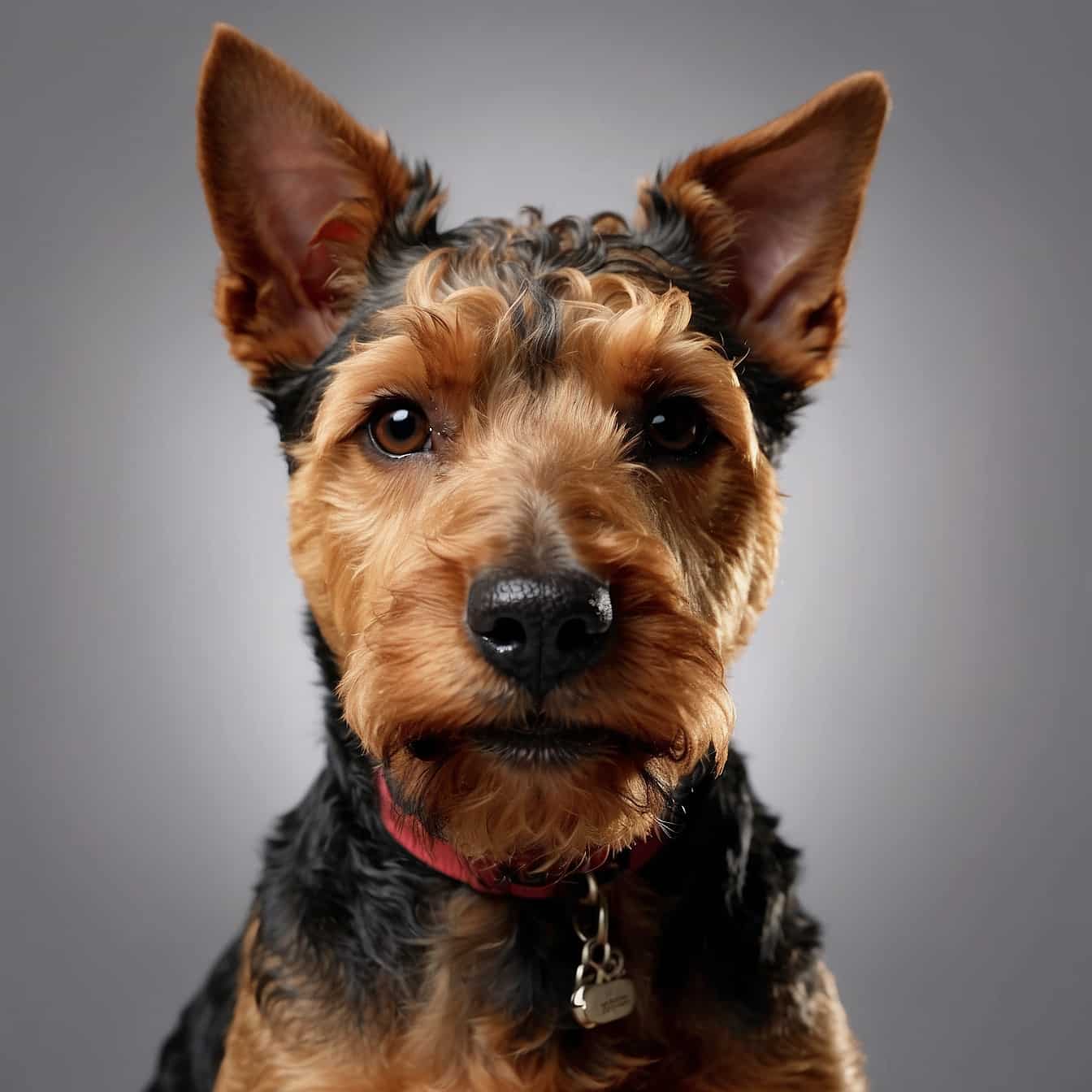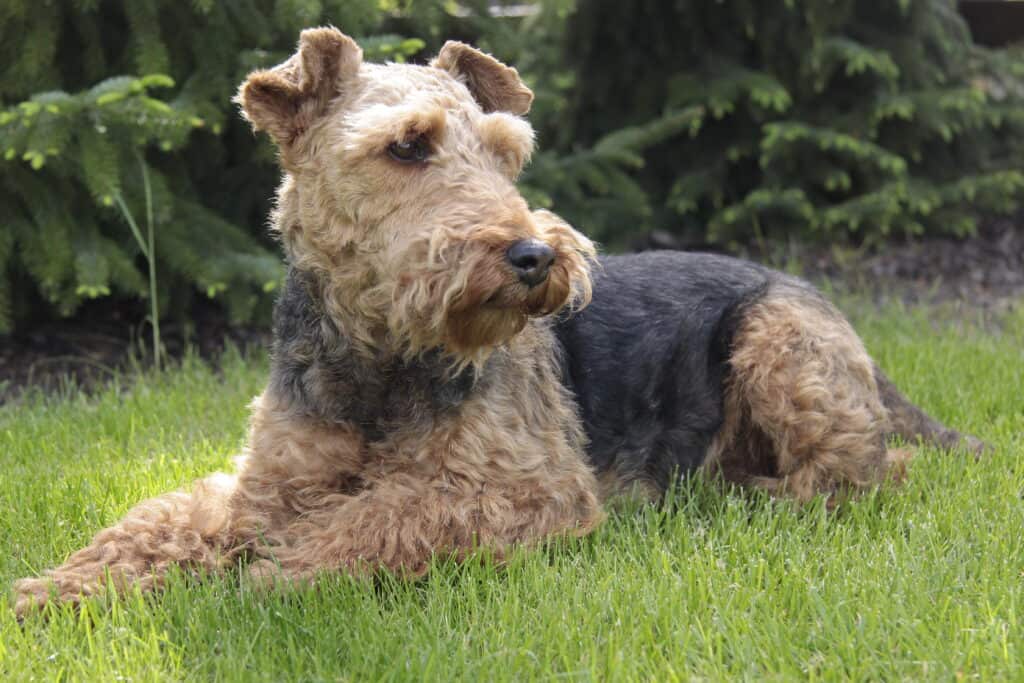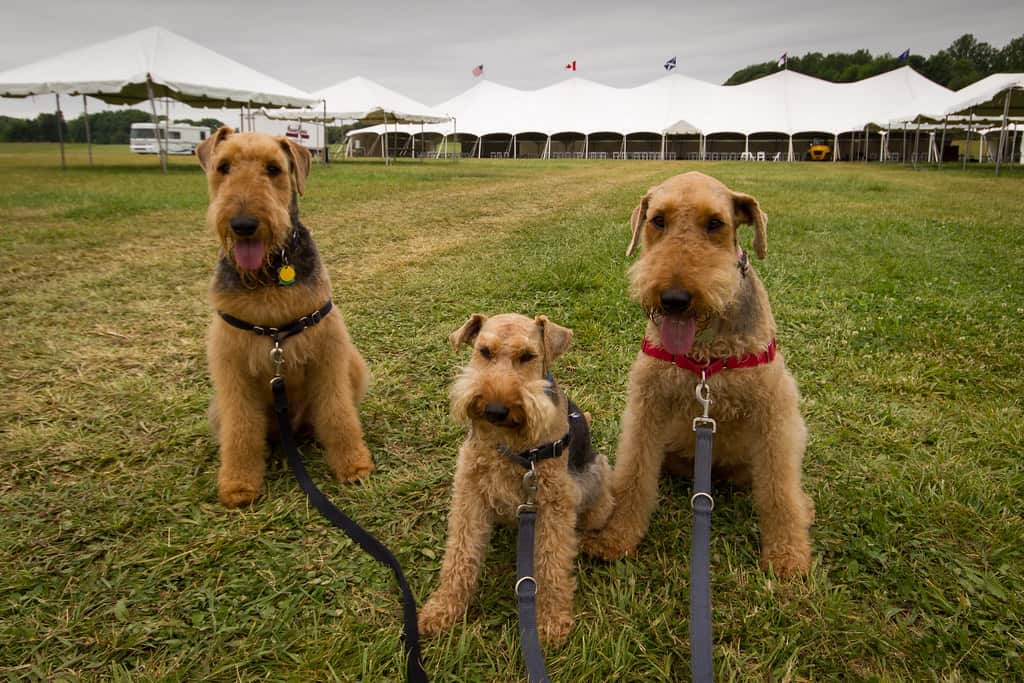Welsh Terriers have a history as hunting dogs and loyal companions. Explore their background, uncover their care requirements, and appreciate the spirited nature that makes them stand out in the terrier world.

| Category (Explanation) | Breed Information |
|---|---|
| Year of Breed Conception | 1700s |
| Country of Origin | Wales |
| Weight (lbs & kg) (Male) | 20-21 lbs (9-9.5 kg) |
| Weight (lbs & kg) (Female) | 18-20 lbs (8-9 kg) |
| Coat Type | Hard, wiry, and straight |
| Color Variations | Tan and black |
| Shedding Level (Low, Moderate, High) | Low to Moderate |
| Height (cm & in) | 15-15.5 inches (38-39 cm) |
| Breed Size | Small to Medium |
| Trainability (Low, Moderate, High) | Moderate |
| Mental Needs (Low, Moderate, High) | Moderate |
| Intelligence Level (Low, Moderate, High) | High |
| Energy Level (Low, Moderate, High) | Moderate |
| Agility (Low, Moderate, High) | Moderate |
| Loyalty (Low, Moderate, High) | High |
| Playfulness (Low, Moderate, High) | Moderate |
| Exercise Needs | Regular exercise and playtime |
| Guarding Proficiency (Low, Moderate, High) | Moderate |
| Sociability with Children (Low, Moderate, High) | High |
| Barking Level (Low, Moderate, High) | Moderate |
| Digging Tendency (Low, Moderate, High) | Moderate |
| Destructive Behavior (Low, Moderate, High) | Low |
| Drooling Level (Low, Moderate, High) | Low |
| Obedience Level (Low, Moderate, High) | Moderate |
| Apartment Friendly (Yes/No) | Yes, with sufficient exercise |
| Inherent Prey Drive | Moderate |
| Physical Risk to Others (Low, Moderate, High) | Low |
| Travel Fatality Risk (Low, Moderate, High) | Low |
| Allergen Potential | Low |
| Health Concerns (List of Common Health Concerns) | Hip Dysplasia, Allergies |
| Average Life Expectancy (Life Expectancy in Years) | 12-16 years |
Woof Mastery is reader supported and our articles may contain affiliate links.
Instead of running third party ads that we have no control of we only use links from high-quality companies we are directly partnered with. Making use of these links come at no cost to you our reader, and in many cases have the extra benefit of discounted rates or sign up bonuses.
If you’re interested you can read more about our affiliate policy here.
We appreciate your support and always insure that the products and services we recommend are high-quality, helpful and relevant to the subject at hand!
Welsh Terriers have a history as hunting dogs and loyal companions. Originating in Wales, they were bred for hunting foxes and otters. Their determined and spirited nature made them well-suited for this role. Over time, Welsh Terriers transitioned from working dogs to beloved family pets. Their spirited character and distinctive appearance have endeared them to families who appreciate their unwavering spirit and loyal disposition.

Welsh Terriers are special for their history as hunting dogs and loyal companions. Their spirited and agile nature sets them apart. Explore their background, understand the care they require, and appreciate the spirited nature that makes them stand out in the terrier world. What makes them special is their role as both versatile working dogs and cherished family pets, adding excitement and loyalty to their owners’ lives.
Welsh Terriers have a traditional role deeply rooted in their history as hunting dogs and loyal companions. Originating in Wales, these dogs were primarily bred for hunting small game, including foxes and badgers. Their determination and spirited nature made them effective hunters. Their strong bond with their owners also made them exceptional companions. While their hunting role has evolved, Welsh Terriers continue to bring their spirited and affectionate traits to households as beloved family members, preserving their heritage as skilled hunters and loyal companions.
Welsh Terriers have a spirited and lively disposition. They are known for their loyalty and agility. These terriers can be loving and make great family pets. They are independent thinkers and require training and socialization to ensure they are well-rounded and affectionate companions.
Welsh Terriers have a history as hunting dogs and loyal companions. They are known for their spirited and tenacious nature. While they can be affectionate with their families, they may exhibit stubbornness at times. Training and socialization are crucial to ensure they exhibit well-adjusted temperaments. Their energetic personalities make them suitable for families who enjoy an active lifestyle.
Welsh Terriers are medium-sized dogs with a dense, wiry, and straight coat that’s typically black and tan. They have a well-proportioned body with a square-shaped head, expressive dark eyes, and V-shaped ears that fold forward. Welsh Terriers have a short tail and strong, straight legs. They have a confident and spirited gait, reflecting their history as hunting dogs and loyal companions.
Welsh Terriers typically have a dense, wiry coat that comes in a black and tan coloration. Their saddle area, covering their back and sides, is usually black, while their legs, head, and ears are tan. This classic and traditional color pattern showcases their spirited and terrier-like appearance.
Welsh Terriers have a dense and wiry double coat that is typically black and tan. This classic coat pattern adds to their distinctive and handsome appearance.
Welsh Terriers have a low shedding level. These small terriers have a dense, wiry coat that sheds minimally throughout the year. Regular grooming is essential to manage their coat and prevent matting. Brushing the coat a few times a week helps remove loose hair and maintains the characteristic texture of the Welsh Terrier’s coat. Stripping or plucking may be necessary to remove dead hair and maintain the breed’s distinctive appearance. In addition to grooming, proper nutrition, regular exercise, and veterinary care contribute to the overall health of the coat and help minimize shedding.
Welsh Terriers have a dense, wiry coat that requires regular grooming to maintain its quality.
Brushing: Brush their coat a few times a week to remove loose hair and prevent matting. Use a slicker brush or a comb suitable for their coat type.
Stripping: Hand-stripping or plucking may be necessary to maintain the breed’s distinctive coat texture. Consult a professional groomer for guidance on this technique.
Bathing: Bathe as needed, typically every few months, to keep their coat clean. Use a dog shampoo suitable for wiry coats and rinse thoroughly.
Ears: Check and clean their ears regularly to prevent wax buildup or infections. Use a damp cotton ball or a veterinarian-recommended ear cleaning solution.
Nails: Keep their nails trimmed to a comfortable length for good foot health.
Teeth: Brush their teeth regularly to prevent dental issues and bad breath.
Welsh Terriers have a moderate activity level. These small terriers enjoy regular walks, playtime, and interactive toys to fulfill their exercise needs. While they are not excessively hyperactive, providing mental stimulation through training sessions and puzzle toys is beneficial. Welsh Terriers thrive on companionship and may enjoy participating in activities with their owners.
Welsh Terriers are known for their intelligence, marked by problem-solving abilities, adaptability, and a desire to please their owners. They are generally trainable and responsive to positive reinforcement training methods. Welsh Terriers can learn various commands and tasks. Their adaptability allows them to thrive in different living environments. Historically, they were skilled in roles such as hunting and vermin control, showcasing social intelligence by forming strong bonds with their families. While they may not top the charts in terms of obedience, their intelligence makes them excellent companions and working dogs. Training, socialization, and mental stimulation contribute to their well-rounded and obedient nature.
Welsh Terriers thrive on mental stimulation. Engage them in activities like puzzle toys, interactive games, and obedience training to keep their minds sharp and prevent boredom.
Social Interaction: They enjoy spending time with their family and need regular interaction. Loneliness can lead to anxiety, so provide companionship and attention.
Exercise: Regular physical activity is important for their mental and physical well-being. Daily walks and playtime contribute to their overall health.
Enter The Woof Mastery

Before bringing a Welsh Terrier into your home, it’s crucial to understand their needs. These dogs require regular exercise and mental stimulation, making them unsuitable for inactive lifestyles. Grooming their wiry coat is necessary to maintain its condition. Welsh Terriers are known for their intelligence and independent spirit, so early training and socialization are vital. Prospective owners should be aware of potential health concerns and provide regular veterinary care. Responsible ownership includes providing ample love, attention, and a safe environment to ensure the well-being of these spirited and charming companions.
Welsh Terriers, with their friendly and spirited nature, generally pose a low risk to others. Proper socialization and training contribute to positive interactions. Responsible ownership, understanding individual temperament, and adherence to local regulations play crucial roles in ensuring a well-behaved Welsh Terrier.
Welsh Terriers are known for being good with children. They are often playful and enjoy family interaction. Supervision is important during play, and positive reinforcement training helps ensure positive interactions. Teaching children how to approach and handle the dog contributes to a positive relationship.
Welsh Terriers may have mixed responses to water. Some individuals may enjoy swimming, while others may not be as comfortable. If you plan to introduce them to water, do so gradually and observe their comfort level. Always prioritize safety and use a canine life vest if needed, especially in situations where they may be at risk of fatigue.
Training your Welsh Terrier puppy is an enriching experience that sets the foundation for a well-behaved and happy adult dog. Embrace the journey and enjoy watching your puppy grow into a wonderful companion!
Welsh Terriers may have moderate barking tendencies. They are alert and may bark to alert their owners or express themselves. Early training and socialization play a crucial role in managing their barking behavior and teaching them appropriate times to vocalize.
Welsh Terriers do well in homes with active families who can provide regular exercise and play. They adapt to various living conditions, including apartments, as long as they receive sufficient mental stimulation. Socialization is important to prevent shyness or aggression. Positive reinforcement training methods work well with this breed.
When traveling with Welsh Terriers, consider their comfort and safety:
By addressing these considerations, you ensure safe and comfortable travel for Welsh Terriers.
Welsh Terriers may be prone to specific health concerns. While not all individuals will experience these issues, it’s important for Welsh Terrier owners to be aware of potential health problems and collaborate with veterinarians for their pets’ well-being. Common health concerns in Welsh Terriers include:
Regular veterinary check-ups, a balanced diet, proper exercise, and responsible breeding practices can help mitigate some of these health concerns in Welsh Terriers.
Proper nutrition is crucial for the health and well-being of Welsh Terriers. Here are some nutritional habits and best practices to consider for this breed:
Breed-Specific Laws (BSL): Welsh Terriers are generally not commonly subject to breed-specific laws (BSL) as they are not typically considered a dangerous breed. However, it’s important to note that BSL can vary widely by jurisdiction, and some areas may have restrictions on specific breeds or breed types.
Local Regulations: To determine if there are any breed-specific laws or restrictions regarding Welsh Terriers in your area, you should check with your local animal control or government authorities. Be aware of and comply with any local regulations to ensure that you are in compliance with the law while owning a Welsh Terrier.
Woof Mastery is reader supported and our articles may contain affiliate links.
Instead of running third party ads that we have no control of we only use links from high-quality companies we are directly partnered with. Making use of these links come at no cost to you our reader, and in many cases have the extra benefit of discounted rates or sign up bonuses.
If you’re interested you can read more about our affiliate policy here.
We appreciate your support and always insure that the products and services we recommend are high-quality, helpful and relevant to the subject at hand!
Myth 1: Welsh Terriers are Difficult to Train
Myth 2: They Don’t Get Along with Children
Myth 3: They are High-Maintenance Grooming Dogs
Myth 4: They are Not Good Watchdogs
Myth 5: They are Not Social Dogs
Myth 6: They Need Excessive Exercise
Myth 7: All Welsh Terriers Look the Same
Myth 8: They are Not Suitable for Families
Myth 9: They Don’t Need Mental Stimulation
Myth 10: They are Prone to Aggressive Behavior
Understanding the true nature of Welsh Terriers helps potential owners provide appropriate care, training, and socialization to ensure they thrive as beloved family companions.
Famous Welsh Terrier examples are not as widely documented, but these spirited and friendly dogs can be found as cherished pets in homes where their lively personality is valued.
The Welsh Terrier is culturally significant as a breed known for its spirited personality and distinctive appearance. Recognized for their friendly demeanor and characteristic coat, Welsh Terriers have become cherished family pets. Their appearance in popular culture, as well as their historical role as hunting and farm dogs, contributes to their cultural significance. Welsh Terriers are symbols of energy and companionship, finding a place in the hearts of dog enthusiasts.
The Welsh Terrier, known for its friendly demeanor and distinctive coat, does not have a single most famous historical owner. However, Welsh Terriers have been appreciated for their versatility as both working dogs and companions.
Welsh Terriers, known for their friendly nature, face challenges that include:
The Welsh Terrier is a small terrier breed known for its friendly and spirited nature. Its development is believed to involve a combination of terrier breeds, including:
Welsh Terriers, with their friendly demeanor and spirited personality, make charming family companions. Known for their loyalty and adaptability, they seamlessly integrate into various living conditions. Their moderate grooming needs and manageable size make them suitable for families. Welsh Terriers excel in activities and training, showcasing their agility and enthusiasm. Their affectionate nature and compatibility with children make them valued additions to households seeking a playful and devoted companion.